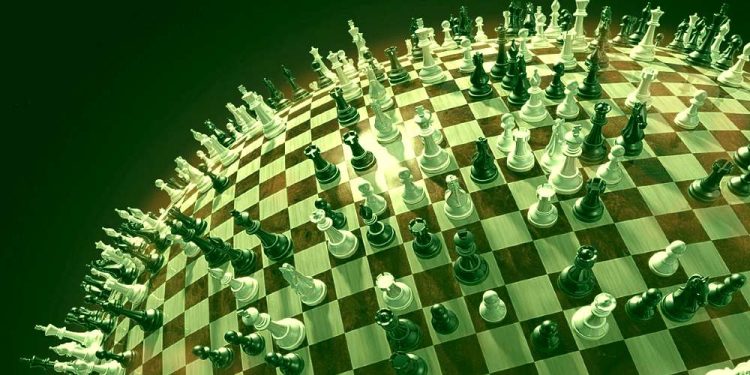Imagine being onboard a giant space vessel traveling through the galaxy in the distant future. You are part of a multi-generational mission meant to colonize another planetary system. The spacecraft you are on is enormous and can support a city-state of human travelers for thousands of years. Then, one day, a member of the captain’s privy council comes to a startling conclusion: at the current rate of the vessel’s population growth, human requirements will exceed resources in a few hundred years.
The captain gathers his trusted advisers in secret to discuss the dilemma. One side is not worried at all. Scientists from this coalition point out that before the ship departed, Earth engineers fully expected future inhabitants to continue innovating and improving the vessel’s capabilities. An agricultural adviser explains that the ship has exponentially increased its food production in the last few generations alone. Speaking to this point, the original doomsayer stands and says, “That’s just the problem. The more food we produce, the healthier our people become. The healthier they become, the more children they have. And the more children they have, the faster we will run out of resources in the future!”
The doomsayer proceeds to paint a picture of the future in which the spaceship is severely overcrowded, and the space travelers are forced to fight for clean air, water, and food. “When such a time arrives,” the doomsayer insists, “there will be riots, famine, and war. There will be revolution. Desperate people will rebel against the ship’s government and hang the privy council!”
“What’s your solution?” another council member asks.
“Depopulation,” the doomsayer answers dispassionately. “We must begin to cull those passengers who offer no benefit to our mission or future survival.”
Many in the gathering are shocked. They demand that nothing so drastic be considered until the whole ship has had a chance to vote. “Are you mad?” the doomsayer snaps. “The people will never vote for their own elimination. And if they did, we’d be the first ones they’d eliminate. No, we must do this in secret — for the passengers’ own good!”
At this point in the animated discussion, a priest stands in opposition. “Fellow members of the privy council, I cannot believe what I’m hearing today. We are not here to destroy human life. We are here to foster human life across the galaxy. We cannot play God. We must pray, seek the Almighty’s guidance, and use the gifts that He has given us to find solutions that safeguard our future. If we start killing others to save ourselves, we betray our ultimate mission as human beings.”
In anger, the doomsayer points an accusatory finger at the priest and shouts, “Don’t tell us about your imaginary God, sir. You are a charlatan, and your Bible is nothing but an opiate for the masses. You are meant to keep the passengers docile, peaceful, and relatively happy. You know nothing of science, and you can save no one with your thoughts and prayers.”
The priest begins to answer, but the doomsayer’s friends shout him down and threaten his removal. “Continue ignoring science and pushing God, sir, and we will begin our depopulation efforts with you.” Silence and fear permeate the room.
The ship’s captain clears his throat and asks the doomsayer what he has in mind. “We need to act on the margins,” the doomsayer responds. “We need to manipulate the spacecraft in subtle ways, so that fewer people are born and more people die suddenly. But we need to make it impossible for passengers to discern what is happening to them.”
The doomsayer, having clearly thought about his plans for human culling in great detail, begins to unveil elaborate proposals for social engineering on a massive scale. There are four main parts, he says. We must (1) destroy the family, (2) keep passengers at war with one another, (3) eliminate uncontrolled innovation by strictly controlling education, and (4) develop the tenets of a “new religion” that elevates the worship of the spaceship above all else.
Women, the doomsayer contends, must be provoked to resent their role in the family. They should see motherhood as a burden, something that distracts them from career success and ship-wide recognition. Being a mother and wife should be scorned as something ugly and outdated. Female passengers should be reminded that there is a secret conspiracy among men — let’s call it the “patriarchy” — that exists to subjugate them.
Furthermore, the doomsayer argues, we should encourage promiscuity and abortion. Loving families produce children. Sexually adventurous singles do not. There’s no reason to stop with women, either. It would be good if we can convince men to see marriage as a form of imprisonment. It would be great if we can convince everyone to doubt the science behind biological sex. What better way to slow population growth than to so confuse passengers about sexual reality that they are too busy experimenting with strange fetishes to get married and have kids?
Next, the doomsayer continues, we must pit the passengers against one another. We must divide them by race, ethnicity, and religion. We must establish new political parties that create tribal loyalties and exacerbate meaningless distinctions. We must keep passengers suspicious of one another and constantly at each other’s throats. We should make some groups’ living quarters too small and hot and blame those conditions on others. We should starve one group and overfeed another. We should maximize resentments and ossify hatreds. Then we should step back when war breaks out and let the passengers “depopulate” themselves.
-
Learn the TRUTH about Gold IRAs and how most precious metals companies play dirty.
If peace ever lasts too long, we can just start an outbreak of disease on one side of the ship and watch the spread of chaos fuel future conflict. Nothing divides a population so quickly as a series of disasters that force everyone to fight for survival. Either through food shortages, contagions, or war, any resulting trimming of the passenger manifest will look quite natural.
Here’s the key, the doomsayer insists: we must control education. It is simply too dangerous to allow everyone to learn whatever he likes. Knowledge provides a foundation for asking sensible questions. Asking questions leads to critical thinking. Critical thinking arms a mind with the tools necessary for questioning authority. Questioning authority will eventually get the privy council hanged!
So above all else, we must keep passengers in the dark and ill equipped to question anything! Fill their minds with superstitions. Teach them to obsess over meaningless ethnic differences and absurd sexual identities. Tell them that mathematics is “racist.” Convince them that reading is “extremist.” But don’t let them learn how to think! Thinking invites innovation, and innovation nurtures talent for solving problems. Some freethinking passenger might one day conclude that there is a better answer than “depopulation.” We can’t have that!
Once the passengers have been deprived of a decent education, the doomsayer concludes, they will be desperate for some greater meaning in their lives. In that void, we will offer them a “new religion.” We will teach them to love and worship this spacecraft as a god! We will convince them to sacrifice their health and happiness for the ship’s survival. We will give lonely people purpose, and they will gladly accept their miserable fates. We will tell them that choosing suicide to “save the ship” is the most “humanitarian” thing they can do. In a few short generations, passengers will “depopulate” themselves for the ship’s salvation.
I don’t know exactly what goes on during private meetings of the Bilderberg Group, Trilateral Commission, or World Economic Forum. But I suspect that those privy councils see Earth as their own private vessel hurtling through space and the rest of us as mere stowaways depleting vital resources. One day, there will be a mutiny.





